Barrie Gavin | |
|---|---|
 Barrie Gavin, 10 June 2005, Cascob, UK. Photo by Dmitri N. Smirnov | |
| Born | 10 June 1935 London, UK |
| Occupation | Film director |
Barrie Gavin (born 10 June 1935) is a British film director.
Barrie Gavin | |
|---|---|
 Barrie Gavin, 10 June 2005, Cascob, UK. Photo by Dmitri N. Smirnov | |
| Born | 10 June 1935 London, UK |
| Occupation | Film director |
Barrie Gavin (born 10 June 1935) is a British film director.
Barrie Gavin was educated at St Paul's School, and studied history at Corpus Christi College, Cambridge from 1954 to 1957. [1] He joined the BBC as an assistant film editor in 1961. With the opening of BBC Two in 1964 he began to direct programmes principally about music.
In the early years of BBC2 there was regular coverage of chamber music and Gavin learnt his craft with many studio-based productions. His experience in the cutting room led inevitably to the making of film documentaries.
In 1966 his fascination with contemporary music brought him into contact with the French composer and conductor Pierre Boulez. Over the next 40 years they collaborated on a series of analytical documentaries on the founding fathers of 20th-century music: Schoenberg, Berg, Webern, Bartók, Stravinsky, Ives, Varese, Messiaen and of course Boulez himself. They made twelve films together:
From the 1970s until the end of the 20th century Gavin specialised in portraits of contemporary composers: Roberto Gerhard, Luciano Berio, Luigi Nono, George Benjamin, Karlheinz Stockhausen, John Adams, Sofia Gubaidulina, Aribert Reimann, Toru Takemitsu, Isang Yun, Harrison Birtwistle, Peter Maxwell Davies, Mark-Anthony Turnage, Oliver Knussen, Hans Werner Henze and many others.
In 1970 Barrie Gavin began to explore folk music with the writer and musician A. L. Lloyd. Together they travelled across the British Isles and visited Romania, Hungary, the United States. The death of A. L. Lloyd in 1984 brought this work to an end.
In 1977 Gavin had been invited to Germany to make a film about Kurt Weill. This marked the beginning of a long association with German television, resulting not only in many adventurous documentaries (mainly in Frankfurt for the producer Swantje Ehrentreich) but also in a new area of work, directing concerts for television. To date he has been responsible for some 250 relays of concerts and opera.
In the 1980s Gavin began a collaboration with the conductor Sir Simon Rattle. They worked on a long series of productions with the City of Birmingham Symphony Orchestra. The list of films created together includes:
In 1989 he worked for the first time with the composer and writer Gerard McBurney. They have produced some ten films, many of them on Russian music, including Think Today, Speak Tomorrow and Giving Voice (two films on dissident composers in the Soviet Union) 1990 The Fire and the Rose (Sofia Gubaidulina) 1990 The Face behind the Face (Shostakovich).
In 2006 he began a collaboration with Gerard McBurney and the Chicago Symphony Orchestra on a series of music documentaries for the internet. They have completed productions on music by Bartók, Mozart, Tchaikovsky, Shostakovich, Holst Vivaldi, Mussorgsky, Sibelius, Dvořák and Debussy. There were created the following films:
The vast majority of Gavin's work has concentrated on music, but he has also produced in 1967 a series on classic film directors. In addition there have been films on literature and the visual arts. Among them: Sir William in search of Xanadu (Award of Montreal Festival of Films on Art, 1984) and Images – A History of Early Photography (Award of New York Festival of Films on Art, 1989).
In 2007 he finished a film, Finding the Music in Croatia, on the composer Nigel Osborne. In 2008 he received an award from International Music Publisher' Association for Services to Contemporary Music. In 2009 he completed a film Towards and Beyond (Jonathan Harvey), a portrait of the composer. In 2010 he made two short films: A Mind of Winter (George Benjamin) and How Slow the Wind (Toru Takemitsu), using music by these composers. He also started work on a continuing series of archival, unedited interviews, mainly with contemporary composers.
Copies of many of Gavin's films on contemporary music have been deposited in the archives of the Paul Sacher Foundation in Basel, Switzerland.
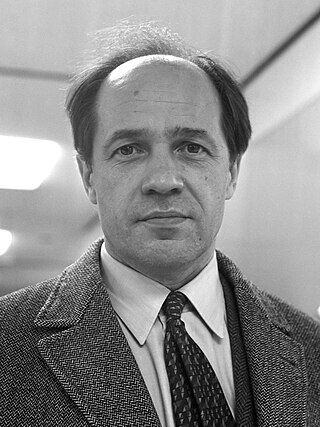
Pierre Louis Joseph Boulez was a French composer, conductor and writer, and the founder of several musical institutions. He was one of the dominant figures of post-war contemporary classical music.
In music, serialism is a method of composition using series of pitches, rhythms, dynamics, timbres or other musical elements. Serialism began primarily with Arnold Schoenberg's twelve-tone technique, though some of his contemporaries were also working to establish serialism as a form of post-tonal thinking. Twelve-tone technique orders the twelve notes of the chromatic scale, forming a row or series and providing a unifying basis for a composition's melody, harmony, structural progressions, and variations. Other types of serialism also work with sets, collections of objects, but not necessarily with fixed-order series, and extend the technique to other musical dimensions, such as duration, dynamics, and timbre.
Yūji Takahashi is a composer, pianist, critic, conductor, and author.
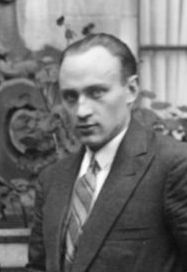
Paul Sacher was a Swiss conductor, patron and billionaire businessman. At the time of his death Sacher was majority shareholder of pharmaceutical company Hoffmann-La Roche and was considered the third richest person in the world with an estimated net worth of US$13 billion.
20th-century classical music is art music that was written between the years 1901 and 2000, inclusive. Musical style diverged during the 20th century as it never had previously, so this century was without a dominant style. Modernism, impressionism, and post-romanticism can all be traced to the decades before the turn of the 20th century, but can be included because they evolved beyond the musical boundaries of the 19th-century styles that were part of the earlier common practice period. Neoclassicism and expressionism came mostly after 1900. Minimalism started much later in the century and can be seen as a change from the modern to postmodern era, although some date postmodernism from as early as about 1930. Aleatory, atonality, serialism, musique concrète, electronic music, and concept music were all developed during the century. Jazz and ethnic folk music became important influences on many composers during this century.
Contemporary classical music, also called modern classical, is classical music composed close to the present day. At the beginning of the 21st century, it commonly referred to the post-1945 modern forms of post-tonal music after the death of Anton Webern, and included serial music, electronic music, experimental music, and minimalist music. Newer forms of music include spectral music, and post-minimalism.

Seiji Ozawa is a Japanese conductor known for his advocacy of modern composers and for his work with the San Francisco Symphony, the Toronto Symphony Orchestra, the Vienna State Opera, and the Boston Symphony Orchestra, where he served as music director for 29 years. He is the recipient of numerous international awards.

Esa-Pekka Salonen is a Finnish conductor and composer. He is the music director of the San Francisco Symphony and conductor laureate of the Los Angeles Philharmonic, Philharmonia Orchestra in London and the Swedish Radio Symphony Orchestra.
Polystylism is the use of multiple styles or techniques in literature, art, film, or, especially, music.
Kreuzspiel (Crossplay) is a composition by Karlheinz Stockhausen written for oboe, bass clarinet, piano and four percussionists in 1951. It is assigned the number 1/7 in the composer's catalogue of works.
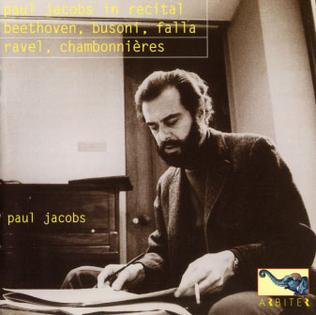
Paul Jacobs was an American pianist. He was best known for his performances of twentieth-century music but also gained wide recognition for his work with early keyboards, performing frequently with Baroque ensembles.
This is the discography of Simon Rattle and other produced works by the English conductor.
The Group for Contemporary Music is an American chamber ensemble dedicated to the performance of contemporary classical music. It was founded in New York City in 1962 by Joel Krosnick, Harvey Sollberger and Charles Wuorinen and gave its first concert on October 22, 1962 in Columbia University's MacMillin Theatre. Krosnik left the ensemble in 1963. It was the first contemporary music ensemble based at a university and run by composers.
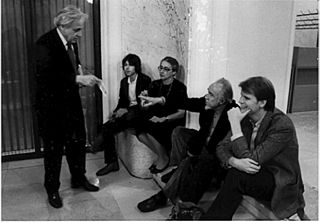
The International Society for Contemporary Music (ISCM) is a music organization that promotes contemporary classical music.
Dai Fujikura is a Japanese-born composer of contemporary classical music.

Sinfonia (Symphony) is a composition by the Italian composer Luciano Berio which was commissioned by the New York Philharmonic for its 125th anniversary. Composed in 1968–69 for orchestra and eight amplified voices, it incorporates musical quotations to represent an abstract and distorted history of culture. The eight voices are not incorporated classically but rather speak, whisper and shout excerpts from texts including Claude Lévi-Strauss' The Raw and the Cooked, Samuel Beckett's novel The Unnamable, instructions from the scores of Gustav Mahler and other writings.
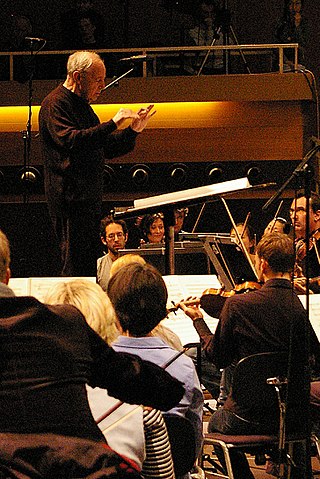
The Donaueschinger Festival is a festival for new music that takes place every October in the small town of Donaueschinger in south-western Germany. Founded in 1921, it is considered the oldest festival for contemporary classical music in the world, and among the best-known and most prestigious.
Konstantin Saradzhev was an Armenian conductor and violinist. He was an advocate of new Russian music, and conducted a number of premieres of works by Pyotr Ilyich Tchaikovsky, Modest Mussorgsky, Igor Stravinsky, Sergei Prokofiev, Nikolai Myaskovsky, Dmitri Shostakovich, and Aram Khachaturian. His son Konstantin Konstantinovich Saradzhev was a noted bell ringer and musical theorist.

Gerard McBurney is a British composer, arranger, broadcaster, teacher and writer.